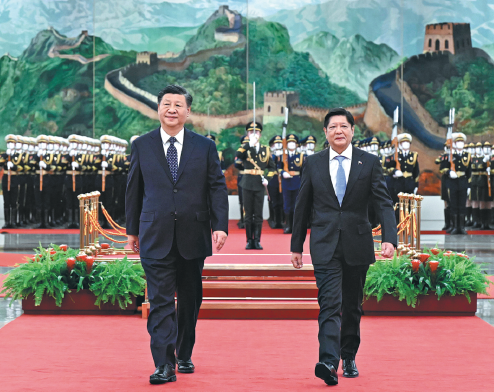Marcos trip strengthens China ties

President Xi Jinping and visiting Philippine President Ferdinand Romualdez Marcos Jr attend a welcoming ceremony on Wednesday before their meeting at the Great Hall of the People in Beijing. SHEN HONG/XINHUA
Philippine president's state visit also shows value of engagement, analysts say
The state visit of Philippine President Ferdinand Romualdez Marcos Jr to China has strengthened diplomatic relations and reaffirmed the importance of Manila's commitment to an independent foreign policy, analysts said.
This is especially crucial as there were straining voices in the past over the South China Sea. But Marcos, who assumed the presidency in June 2022, has declared that the Philippines "is a friend to all and an enemy to none". Such an approach toward foreign policy, analysts said, is needed to look at the bigger picture.
Anna Malindog-Uy, vice-president for external affairs at the Asian Century Philippines Strategic Studies Institute, said that one of the "most critical political gains" of Marcos' first state visit to China is the agreement between the two sides to move forward on an arrangement for the establishment of a communication mechanism on maritime issues, between the Department of Foreign Affairs of the Philippines and China's Ministry of Foreign Affairs, to avoid any possible mistakes and misunderstandings.
Malindog-Uy said that despite the Philippines' differences with China over the South China Sea, Manila does not view China as "an adversary but instead as a good friend and neighbor".
"This means we are engaging with China … maintaining close, cooperative and friendly relations with it, while putting utmost priority on the country's national interests above all else," she told China Daily.
Aaron Jed Rabena, research fellow at the Manila-based think tank Asia Pacific Pathways to Progress, said Marcos' visit is "strategically important" and showed that the Philippines is keen to have a "civil relationship" with China.
Rabena said in an online forum that the Philippines recognizes "China's profile as a great power". He described Marcos' visit as "pragmatic" as China is an important economic partner for the Philippines.
Marcos visited Beijing from Jan 3 to 5 at the invitation of Chinese President Xi Jinping. Marcos was the first foreign head of state that China received in 2023. The trip also marked Marcos' first visit to a nonmember state of the Association of Southeast Asian Nations as president.
On Thursday, Xi and Marcos issued a joint statement in which the two leaders said that they had an in-depth and candid exchange of views on the situation in the South China Sea, emphasized that maritime issues do not comprise the sum total of relations between the two countries and agreed to appropriately manage differences through peaceful means.
Consensus reached
Both sides reaffirmed the importance of maintaining and promoting peace and stability in the region and the freedom of navigation in and overflight above the South China Sea. Xi and Marcos also reached a consensus on the peaceful resolution of disputes on the basis of the Declaration on the Conduct of Parties in the South China Sea, the United Nations Charter and the 1982 United Nations Convention on the Law of the Sea.
Malindog-Uy said the Philippine pursuit of an independent foreign policy allows the country "to strike more leverage" with China as apprehensions relating to military encirclement by Washington is a top concern in the South China Sea. It also meant that the Philippines "will not allow itself to be used as a pawn by the United States, militarily speaking, to encircle China" in the region.
George Siy, chairman emeritus of the Manila-based Anvil Business Club, said the Philippines' relationship with China is "a major stabilizer". China is "an enabler" in Philippine infrastructure development, Siy said, noting how China has helped finance infrastructure projects in the island nation.








